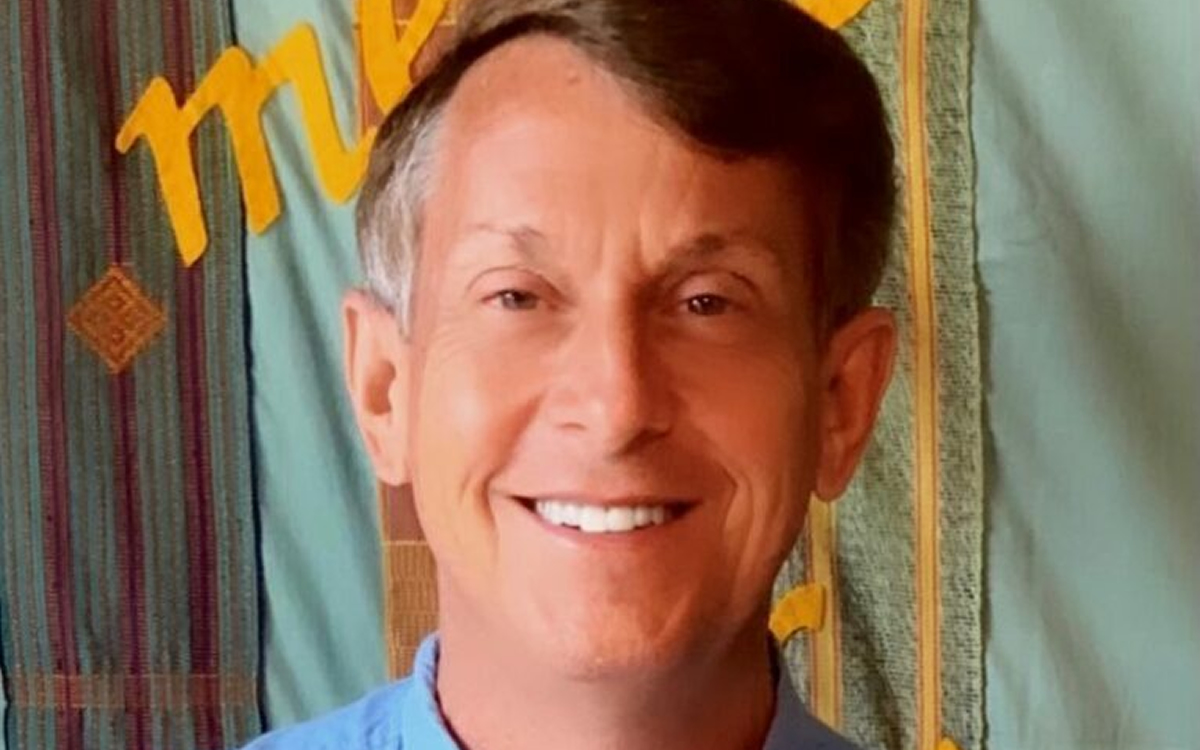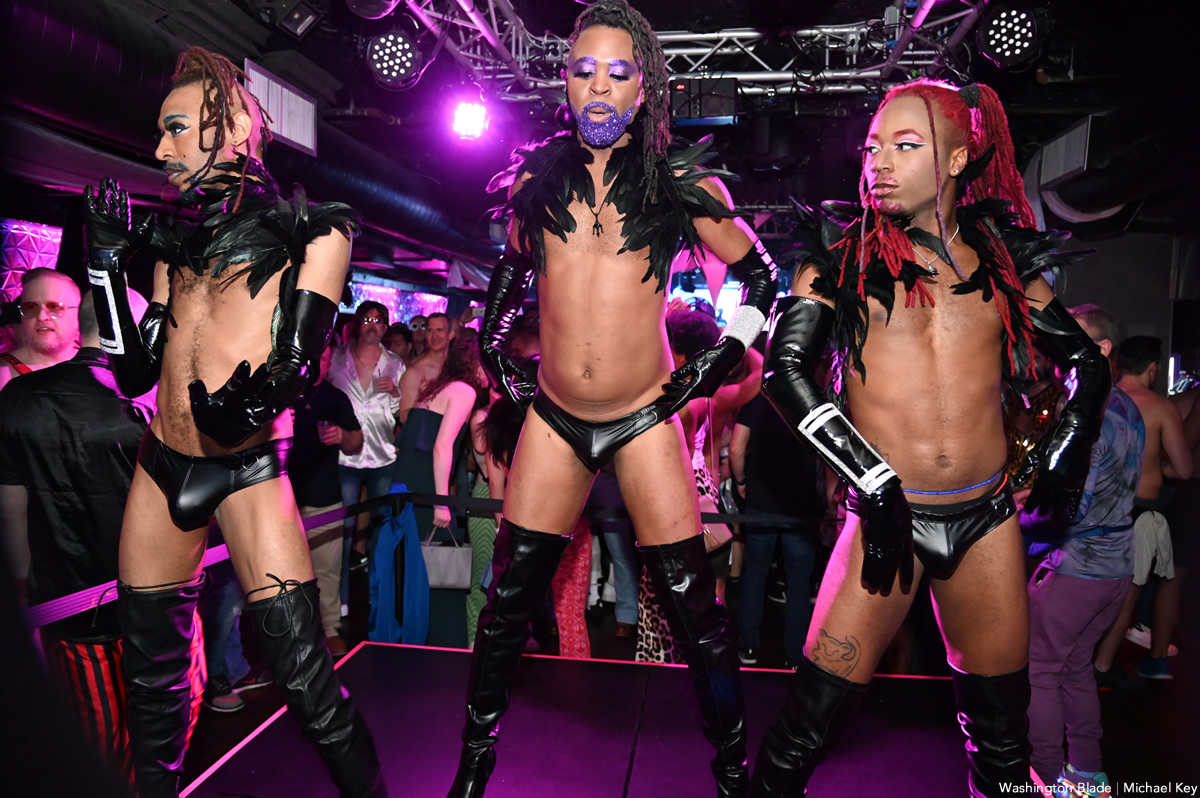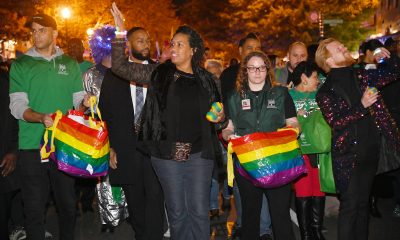District of Columbia
Washington AIDS Partnership to close at end of 2023
After 35 years, officials say ‘celebratory close’ comes after mission accomplished

The D.C.-based Washington AIDS Partnership, which describes itself as a philanthropic and advocacy organization that has provided more than $35 million in funding since its founding in 1988 to local organizations providing AIDS-related programs and services, has announced it will end its operations at the end of this year.
“After much thoughtful consideration, the Washington AIDS Partnership (WAP) is planning an intentional and celebratory close at the end of 2023 after 35 years of service to the D.C. community,” a statement released by the group says.
Channing Wickham, the organization’s longtime executive director, said he and the WAP’s board and staff strongly believe it has accomplished its mission of playing a key role in helping D.C. and surrounding communities become a national leader and role model in the support and care for people with HIV/AIDS and in the lowering the new HIV infections.
“One of the most important things to say and to be very clear about is that HIV is not over,” Wickham told the Washington Blade. “And we’re by no means saying that it is,” he said. “It’s just that our part in this is coming to a close.”
Wickham noted that through its funding, advocacy, and support work, Washington AIDS Partnership helped put in place local programs, including major improvements in the late 1990s and early 2000s of the D.C. Department of Health’s HIV/AIDS office, which evolved into the current HIV/AIDS, Hepatitis, STD, and Tuberculosis Administration (HAHSTA).
He points out that WAP, through its funding and support programs, also helped nurture and grow local organizations that currently provide the services that will carry on WAP’s mission. Among them, he notes, are organizations that provide HIV/AIDS services for the LGBTQ community, including Whitman-Walker Health, Us Helping Us, and HIPS.
One of WAP’s projects involved training young people through the federally funded AmeriCorps program, Wickham said. At one-point WAP had 12 AmeriCorps members who “worked on the front lines” of HIV/AIDS programs, including as volunteer staff members to local AIDS organizations, according to Wickham.
“Since about 2005, we have been the largest HIV private funder in the region,” he said. “But we were much more. We also were a public policy organization. We were a youth development organization,” he said, through the AmeriCorps program.
“WAP has provided over $35 million in funding to local organizations that focus programming and resources on the communities most affected by the epidemic,” the WAP statement says. “These grants have supported projects that significantly changed the landscape of HIV treatment and prevention in the District,” the statement says.
Megan Davies, Whitman-Walker Health’s Chief Program Officer, said Whitman-Walker has been the recipient of many WAP grants over the past 30 years in support of Whitman-Walker’s AIDS programs, including AIDS prevention efforts.
“Additionally, we have been a Washington AIDS Partnership AmeriCorps site for over 15 years, and it has been an honor working with such incredible individuals,” Davies said. “These young people brought so much energy and innovation to Whitman-Walker Health,” she said. And while there is still much to be done, Davies added, Channing Wickham and WAP “have helped D.C.’s rates of HIV incidence improve dramatically.”
In its early years and through the early 2000s, WAP has been credited with creating a new and highly effective way to provide funding for local, community-based HIV/AIDS organizations. As Wickham describes it, WAP, among other things, became a philanthropic foundation that helped other far larger foundations and individual donors, including private-sector companies, decide how to support efforts to effectively address the HIV epidemic.
Several of the nation’s most prominent philanthropic foundations, including the Morris & Gwendolyn Cafritz Foundation and the Gannett Foundation, donated millions of dollars directly to Washington AIDS Partnership and entrusted WAP to decide on the big donors’ behalf which local community groups should receive those funds through WAP grants.
“What we had was people at the table making these grant decisions,” Wickham said. “We had foundation representatives who entrusted us with their money. But we also had community leaders,” said Wickham. “We also had people living with HIV. So, we had the experts.”
Added Wickham, “We created a mechanism where together community and philanthropy and people with HIV were all together in a room and could talk through proposals and make the right decisions on where that money should go. We created a place where there was expertise that did not exist in individual foundations.”
Through that process over the years, according to Wickham, many of the individual foundations developed their own expertise on how to select and support local organizations doing HIV/AIDS work. And that, among other things, is part of the reason why WAP feels it has accomplished its work and can close its operations.
“It’s not insignificant to have the Partnership go,” Wickham told the Blade. “But, again, sometimes you have to know when it’s time to say we have succeeded, that we have accomplished our mission.”
Wickham is also quick to dispel rumors that have surfaced that one of the reasons WAP is closing is that he was retiring as executive director. He said he has no plans to retire after WAP closes at the end of the year, noting that he has plans to continue to be active in local and national causes.
“So, I’m not the story here,” he said. “The story is philanthropy came together in 1988 and over 35 years changed the course of the epidemic in our region. And at the right time, we decided that this philanthropic effort should sunset. I think that’s really the message,” Wickham points out.
“And I think that nonprofits should not go on forever, that once you accomplish your mission, then it’s time to say goodbye,” he said.
District of Columbia
D.C. parties with a purpose for Cherry Weekend
LGBTQ community to benefit from money raised

Washington’s queer community will have the opportunity to party with a purpose this weekend as Cherry Weekend returns to raise money for LGBTQ organizations in D.C.
Cherry Weekend is an annual celebration of parties, DJs, and drag that gives the LGBTQ community a chance to let their hair down, dance, drink and be merry-while supporting some of the city’s most vulnerable queer residents through the Cherry Fund.
This year’s Cherry Weekend runs April 11-13, with four parties, eight DJs and one iconic drag performance from Detox, a former “RuPaul’s Drag Race” contestant, all in support of the Cherry Fund.
Founded in 1996 by local LGBTQ residents, the Cherry Fund raises money to make Washington a safer and more inclusive place for LGBTQ people to live, grow and thrive. Cherry Weekend is the nonprofit’s flagship fundraising event, supporting LGBTQ community members living with HIV and those struggling with mental health challenges.
The Cherry Fund has donated to a wide range of D.C.-based organizations over the years. This year, proceeds will support the DC LGBTQ+ Community Center, and the ReelAbilities Film Festival of Greater Washington, which promotes “awareness and appreciation of the lives, stories and artistic expressions of people with disabilities.”
As the longest-running 501(c)(3) nonprofit circuit party organization in the U.S., the Cherry Fund has a reputation to uphold-and in 2025, it’s doing so with four “CHERRY ELEMENT”-themed dance parties across the city.
The weekend kicks off at 11 p.m. Friday with the “AIR” party at DC9 Nightclub (1940 9th St., N.W.) in Shaw. DJs Orel Sabag (Israel) and Jake Maxwell (U.S.) will spin music to “elevate your spirit and unite your soul in a celebration of the CHERRY element.”
Saturday night brings the main event: The “FIRE” party at Betty in Brentwood (1235 W St., N.E.), featuring Detox, along with DJs Tezrah (U.S.) and Las Bibas from Vizcaya (Brazil). From 10 p.m. to 4 a.m., “scorching beats” and a fiery atmosphere will heat up the dance floor.
After the smoke clears, Flash Nightclub in Shaw (645 Florida Ave., N.W.) will host the “EARTH” after-party from 4-8 a.m. Sunday, with DJs Calagna (U.S.) and Ed Wood (Puerto Rico) providing the soundtrack.
The weekend wraps Sunday night with the “WATER” party at Bunker (2001 14th St., N.W.), where DJs Chord (U.S.) and Jesus Montanez (Mexico) will play “cool, flowing beats” from 10 p.m. to 2 a.m.
Tickets and a full schedule are available at CherryDC.com. To learn more about the Cherry Fund, visit CherryFund.org.
District of Columbia
WorldPride organizers may warn trans people from abroad not to attend event
Capital Pride official cites anti-trans policies of Trump administration

One of the lead organizers of WorldPride 2025, set to take place in D.C. May 17-June 8, told members of the Metropolitan Washington Council of Governments, known as COG, on April 9 that due to the recently implemented anti-trans policies of the Trump administration, it may be dangerous for trans people traveling from abroad to attend WorldPride in D.C, according to a report by WTOP News.
The WTOP report says the message of concern was delivered by Ryan Bos, executive director of D.C.’s Capital Pride Alliance, which is the lead organizer of WorldPride 2025. The news report says Bos spoke at a meeting of COG, which consists of local government officials from D.C. and the surrounding suburban counties in Maryland and Virginia.
“It’s possible that we may actually issue a statement telling trans folks internationally not to come, or if they come, they come at their own risk,” WTOP quoted Bos as saying.
“So, these are the things that we will be discussing with the D.C. government and our partners to determine how best to communicate that to ensure that we’re getting the resources to the folks that need it,” Bos said according to the WTOP report.
WTOP reported that some members of the COG board expressed concern over the news that it may be harmful for trans people to travel to the D.C. area for WorldPride.
“It’s really shameful that you all are having to consider making statements like that,” WTOP quoted Frederick County, Md., Executive Jessica Fitzwater as saying. “It’s really heartbreaking.”
D.C. Council member Charles Allen (D-Ward 6), who attended the COG meeting, told Bos, “I’m disheartened to hear that, but I hope you also recognize you’ve got partners in this room that want to be right there with you to make sure this is a wonderful, successful event, a safe event, that’s going to take place across the whole region,” WTOP reports.
Capital Pride Alliance, in response to a request for further comment on Bos’s remarks at the COG meeting, said in a brief statement that Bos’s presentation was limited to what “may happen.” The statement said no official decision has been made regarding a possible warning for trans people considering attending WorldPride.
District of Columbia
Capital Jewish Museum announces LGBT exhibition
‘LGBT Jews in the Federal City’ set to open during WorldPride

D.C.’s Capital Jewish Museum has announced plans to open a special exhibition called “LGBT Jews in the Federal City” on May 16 that will remain at the museum at 575 3rd St., N.W. until Jan. 4, 2026.
“This landmark exhibition explores a turbulent century of celebration, activism, and change in the nation’s capital led by D.C.’s LGBTQ+ Jewish community,” according to a statement released by the museum.
“This is a local story with national resonance, turning the spotlight on Washington, D.C. to show the city’s vast impact on LGBTQ+ history and culture in the United states,” the statement says.
The statement notes that the exhibition will take place as D.C. hosts WorldPride 2025, which is scheduled to be held in locations across the city from May 17 through June 8. It points out that the LGBT exhibition will also take place during Jewish American Heritage Month in May and Pride Month in June.
“‘LGBT Jews in the Federal City’ will present more than 100 artifacts and photographs, representing the DMV region’s Jewish LGBTQ+ celebrations, spaces, joys, and personal stories,” the statement adds.
It says a centerpiece of the exhibition will be The Bet Mishpachah Collection, a new museum acquisition focusing on the LGBTQ supportive synagogue founded in D.C. in 1975 that is celebrating its 50th anniversary this year.
“This assemblage represents one of the most extensive archives of an LGBTQ+ Jewish congregation in the nation,” the statement says. “Selections from the collection will be on view for the first time.”
Other aspects of the exhibition, the statement says, include campaign posters and photos related to D.C. gay rights pioneer Frank Kameny; archival records from the Washington Blade, the exploring of “the wide variety of changes made at area synagogues,” and a panel from the AIDS Memorial Quilt that features a prominent Jewish Washingtonian who was lost during the AIDS epidemic.
“Through prompts, questions, and thoughtful design throughout the exhibition, visitors will be encouraged to ponder new ways to understand Jewish teachings and values as they relate to gender and sexuality,” the statement points out.
“After leaving the exhibition, visitors can contribute to the Museum’s collection and storytelling by sharing photographs, personal archives, or by recording stories,” it says.
“As board president at the Capital Jewish Museum and longtime member of both the Jewish and the LGBTQ communities in D.C., I am very proud that we are the first museum to bring to life the stories of the LGBTQ Jewish community in the federal city,” said Chris Wolf, president of the museum’s board of directors.
“We are deeply honored to present this show, our first self-curated special exhibition – adding Jews into the rich, proud history of LGBTQ+ D.C.,” said Beatrice Gurwitz, the museum’s executive director. “This exhibition will help write the local, regional, and national history of the Jewish LGBTQ+ community.”
Among the “Premier Sponsor” financial supporters of the LGBT exhibition, according to the museum statement, is Jeffrey Slavin, who’s gay, and has served as the mayor of Summerset, Md., in Montgomery County, since 2008.
“I think it’s so important for us to tell our stories,” said Slavin, who said he was honored to help support the exhibition in his role as a gay elected official who grew up in the Jewish community in the D.C. area.
-

 District of Columbia1 day ago
District of Columbia1 day agoWorldPride organizers may warn trans people from abroad not to attend event
-

 District of Columbia3 days ago
District of Columbia3 days agoLocal officials weighing impact of Trump’s D.C. executive order
-

 South Africa5 days ago
South Africa5 days agoUS-funded South African LGBTQ groups curtail operations
-

 Maryland3 days ago
Maryland3 days agoTrans Maryland founder: Trans people ‘are afraid’









